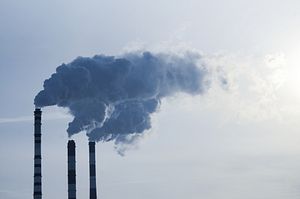In a press conference on Tuesday, the chairman of China’s Advisory Committee on Climate Change, He Jiankun, announced that China will for the first time set a cap on its carbon dioxide (CO2) emissions.
As Reuters points out, there’s still a lot of uncertainty regarding the announcement. We don’t know how high the cap will be; details of the next five-year plan won’t be worked out until next year, and will take effect in 2016. He Jiankun also implied that the cap will be future-oriented, saying that China’s emission rates will continue to grow until an expected peak in 2030.
Despite these unknowns, the announcement from China is potentially a game-changer in the global fight against climate change. China had never before been willing to agree to a concrete cap on emissions, preferring instead to lower its “emissions intensity” (the ratio of emissions rate to GDP). However, given China’s rapid GDP growth, China’s reductions in emissions intensity equated to massive increases in absolute terms. As Georgetown environmental researcher Joanna Lewis pointed out, China’s promise to reduce carbon intensity to 46 percent of 2005 levels by 2020 would result in a 73 percent increase in the actual amount of emissions over the same period.
China’s refusal to consider an absolute cap on emissions was a major contributing factor to the failure of the 2009 UN climate change summit in Copenhagen. The announcement that China is now embracing such a cap of its own accord will provide a boost to the 2014 climate change conference in Bonn, Germany, which is set to open tomorrow.
Indeed, to many analysts the most exciting thing about the announcement is its timing. China announced an eventual emissions cap just before the UN climate change conference, and just after U.S. President Obama revealed his own ambitious environmental agenda. To many, this suggests a level of coordination and cooperation between the U.S. and China on the global climate change effort that has not existed before. As the two largest emitters of greenhouse gases in the world, U.S. and Chinese commitment to the issues is crucial — but has been missing from previous international discussions.
Now, that appears to have changed. At the end of May, I pointed out that the U.S. and China were both renewing their domestic efforts to fight climate change, setting the stage for the possibility of U.S.-China cooperation on the next international climate change agreement. The unveiling of two separate domestic initiatives so close together suggests either close cooperation or a sense of competition. Either would be good for the global effort — a U.S.-China race for perceived global leadership on this issue could motivate both to act more decisively than they would otherwise.

































